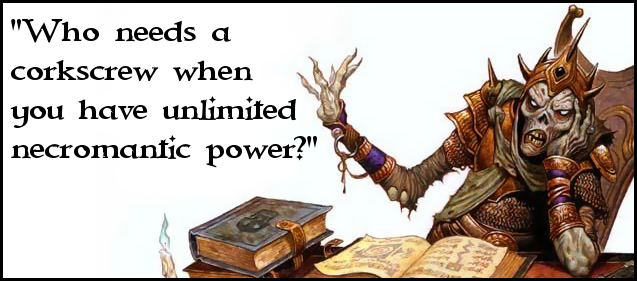Spellcasters are too damn complicated
NPC spellcasters are, at least. I’m having a blast playing a dwarf abjurer in one of my 5th edition games, but I hate using casters as a Dungeon Master. They just have too many options.
Magic-users are renowned for their versatility. They wield a huge arsenal of spells, and can voluntarily change their class features just by taking a snooze. Unsurprisingly, this level of tactical flexibility is very attractive to veteran players. Adventurers never sit still. They explore sunken temples, flying castles, and everything in between. The adaptable adventurer is almost always more powerful than one whose abilities are set in stone.
An NPC with this level of versatility is a chore to DM. Unless your spell-casting monster is a major villain, they probably won’t ever need to adapt to new situations. They’ll probably only around for one encounter. Paizo Publishing warns their Pathfinder designers that most combats only last only 3–5 rounds, with one side dead or retreating in the final round. A monster that has more than three unique abilities simply cannot bring them all to bear in a single combat. Unless it is very survivable or very lucky, it just won’t be alive long enough!
This poses serious problems for spell-wielding monsters. I’m specifically looking at the Mage in the 5th edition Monster Manual and Basic Rules. The Mage (its awesome artwork aside) is a tactical mess. At its disposal are four cantrips, four 1st-level spells, two 2nd-levels, three 3rd-levels, two 4th-levels, and one 5th-level spell.
Sixteen unique abilities have been slapped onto one monster. Or, to put it another way, this monster has a dozen abilities it will never use in combat. This wizard truly is a magical Swiss Army knife, but (to extend the metaphor) does it need a corkscrew when it already has a blade, a can opener, and a screwdriver?
Too many options can paralyze even experienced DMs. Choice paralysis is a major cause of wasted time at the game table for players and DMs alike. And honestly, the DM has enough on her mind already. Most encounters have two or three different types of combatants for her to worry about, all with wildly different abilities and tactics competing for her attention.
So how do we simplify? If your Mage is just a high-level minion of this week’s villain, his narrative purpose is to spice up the encounter with a few rockin’ spells, and then die magnificently in 3–5 rounds. Follow Paizo’s example: strip the monster’s abilities down to its three most important powers. Maybe four if you’re feeling confident in his ability to stay out of the fray.
You know your players best, so it’s up to you to choose the most powerful and interesting abilities to use. I recommend giving him one 3rd-level, one 4th-level, and one 5th-level spell. Let him use the 3rd- and 4th-level spells at-will, but limit the 5th-level spell as a 1/day ability. It’s his ace in the hole.
My recommendations are fireball (it’s iconic and powerful), greater invisibility (for when things go pear-shaped), and dominate person (especially if you have a player who enjoys being the bad guy for a couple of rounds). A solid fourth spell would be fly, since it improves the Mage’s limited mobility in almost every situation. I’ve tried to only use the spells already included in the Mage’s stat block to keep his power level about the same as his original incarnation. Of these four, dominate person is the only one not on his original spell list.
One last thing. From a story perspective, it’s not as if the Mage only knows three or four spells. If the heroes hunt down his spellbook, they’ll find all sixteen spells that he “knows” written there. This simplification is purely for the DM’s benefit. After all, your players will never know.
